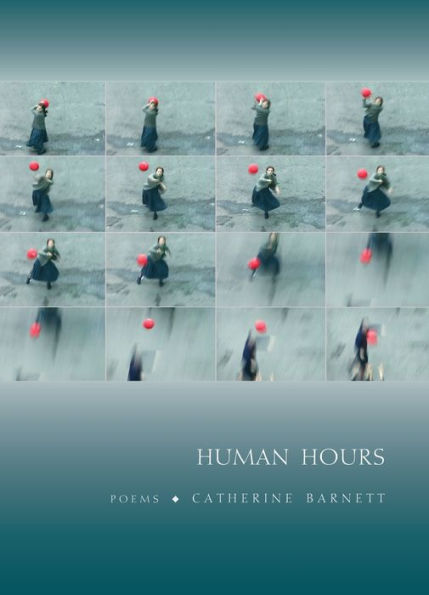“Often when I’m in despair,” Catherine Barnett writes at the beginning of “The Sky Flashes,” “I turn to the back page / of the New Yorker and try to think up something / funny to say.” And then, just a little farther in:
Last summer I was so low
I ran out of magazines.
I got obsessed with entropy.
Is the world more closely aligned with chaos
or with order? I asked everyone I love.
Chaos, my sister said, because she’s a doctor.
Order, my mother said,
because she’s an abstract expressionist.
 The lines, as written, present an excess of order: her unequivocal explanations for the two answers, and the comically neat effect of her despair; the human binary across which the inhuman universe is imagined to tilt; and the sentences slotting so neatly into the lines that they turn almost brittle, with only Barnett’s modest whimsy allowing the joints to flex. At two points, a sentence spills over, but even then without much fuss. In the first case, it divides cause and effect. The second, after “order,” keeps “order” and “chaos” comfortably apart; midway through the next line, a question mark ends a sentence mid-line, but then the sentence just keeps going. Broken and then orderly again, it continues on to the end of the line, where “everyone I love” appears, a sudden and surprisingly rich intimacy (and a hunger as plain and affecting as “Last summer I was so low,” which ended in the very human and very sad comedy of “I ran out of magazines”).
The lines, as written, present an excess of order: her unequivocal explanations for the two answers, and the comically neat effect of her despair; the human binary across which the inhuman universe is imagined to tilt; and the sentences slotting so neatly into the lines that they turn almost brittle, with only Barnett’s modest whimsy allowing the joints to flex. At two points, a sentence spills over, but even then without much fuss. In the first case, it divides cause and effect. The second, after “order,” keeps “order” and “chaos” comfortably apart; midway through the next line, a question mark ends a sentence mid-line, but then the sentence just keeps going. Broken and then orderly again, it continues on to the end of the line, where “everyone I love” appears, a sudden and surprisingly rich intimacy (and a hunger as plain and affecting as “Last summer I was so low,” which ended in the very human and very sad comedy of “I ran out of magazines”).
Of course, any form of excess also implies its opposite, and so the lines also register, on their careful, human scale, not only the possibility of chaos but the presence — around us and in us — of a universe too large, and too thorough in its unraveling of human being, to allow even the mind that might ask such a question to endure. At the same time, though, these lines, that poem, and a controlling majority of the writing in Human Hours, the book in which it appears, feel remarkably consoling, and companionable. They seem to assemble not so much a voice but a body, a way of moving that reveals —and in revealing, that exposes — an embodied mind living awkwardly and graciously in the vulnerable body that orchestrates that mind.
In trying to explain to myself why these poems matter so much to me, I keep cobbling together oxymorons: a brittle grace, say, or maybe a graceful brittleness. I kept thinking how strange it is to be a person, and how obvious, how inescapable it is — until, of course, it’s not.
The poem continues:
I showed my father a cartoon
of a psychiatrist wearing a halo
and a man stretched out on the couch.
I’m afraid I can’t help you with that one, he said,
and I was sure he’d win.
I told my sisters look, dad’s okay, his mind still works,
he’s still a funny man.
It took me all these months to realize
he was only answering me—
I’m afraid I can’t help you with that one,
you, whoever you are.
It’s funny — of course it is. (As is the joke — “my favorite joke,” she says — that ends the poem, and which she introduces by writing “If you’d laugh, I’d feel a little less alone.”) And of course it’s brutally sad. The loss of her father’s mind is one of the persistent sources of despair in these poems, one of the causes of incomprehension that Barnett assembles into coherence. A nest: sometimes reading the book that seemed right: whatever’s available and promising or prominent woven together with whatever else fits that same description — magpie, bent, all seams, all one, fragile, and secure. So often, Barnett seems (emphasis here on “seems”) to be grabbing whatever’s at hand, including scraps of poems and plays, including a fair amount of Beckett, but also enough other sources to fill four pages of notes in the back of the book, not to mention things that feel more momentary, like the uncaptioned New Yorker cartoon in the lines above. Or, in “An Apprehension,” alongside Kafka, a security panel called Qolsys, recently installed:
I stood up and stretched.
Face-to-face with Qolsys,
I peered into the sensors, into the little hole
of the siren, and touched up my lipstick.
Maybe I can ask Dave to come back, I thought,
Dave from Royal Security,
Dave with the smoky brown eyes,
maybe he can help.
I took off my slippers,
my bargain-basement bra, and danced.
Silence. Not even a mechanical cry —
I wondered if the fault were mine.
Maybe I miswired the hard data?
The soft data?
Maybe the poor thing simply had no loins.
I opened the window.
Window opening, said Qolsys
in a deep male voice.
 Loneliness, too: there’s so much loneliness in these poems — the body they describe and the body they compose both remarkably present and overlapping, insufficiently cherished, persuasive even in their comic poses — the comedy itself a persuasive part of the body, and of the mind’s sometimes baffled awareness of the body it moves. Lines like “Maybe the poor thing simply had no loins,” in their distancing humor, seem also to bring closer the embodied and often lonely figure that engages in such sad and agile play. It feels like a form of candor — a candor that allows for human imperfection, that is itself imperfect, but beautifully so, much like the body that in undressing calls attention to the “bargain-basement bra.”
Loneliness, too: there’s so much loneliness in these poems — the body they describe and the body they compose both remarkably present and overlapping, insufficiently cherished, persuasive even in their comic poses — the comedy itself a persuasive part of the body, and of the mind’s sometimes baffled awareness of the body it moves. Lines like “Maybe the poor thing simply had no loins,” in their distancing humor, seem also to bring closer the embodied and often lonely figure that engages in such sad and agile play. It feels like a form of candor — a candor that allows for human imperfection, that is itself imperfect, but beautifully so, much like the body that in undressing calls attention to the “bargain-basement bra.”
That apparent imperfection — that simultaneous candor and contrivance — makes room for a lot: sexism, sex, family, motherhood, politics, art, uncertainty, nature, aging, books, time, death, technology, hope, public life, private spaces, etymology, justice . It also allows Barnett to thread in little lines of soaring lyric grace, laying them comfortably alongside mundane concerns: “I drove into the woods and there it was, / shining like the human mind.” “YOU WERE HERE // says the silvery green light of time / breathing in and out like any mortal.” “… like the female moorland hawker falls from the sky / to avoid harassment then lifts up again, / like rhizomes cold hard drunk in winter soil // each spring rise up like the impossible promise.” “Every day the women open their eyes / and follow me into the streets, // the cities, like a wind murmur begins / a rumor of waves, the faces of earth / saying let this pain be error upon me writ.”
And then her descriptions of her body:
Whenever I see a bald spot I want to shout a little.
in praise. Such ephemera between my salty legs–
And:
… lit from within
like the intimacies of L’Origine du monde,
a painting I love because it makes
beautiful what I’ve mostly kept hidden
in shame. Cunt, some of you have called it,
or God, pulsing there in the small gilt frame.
And:
Tiny batteries in my breasts,
which hummed along, expectant.
Or, in a different register, “my sturdy self-lubricating relic.”
And all those lines hold the weave alongside others in other veins, statements like:
Clowns are clichés that aren’t afraid of clichés.
Mine just sleeps when she’s tired.
But she can’t shake the hopes.
Or, a few lines later, from the same poem:
I’m so stuffed with it the comedians at the Cellar never call on me,
Even when I’m sitting right there in the front row with a dumb look of hope
on my face.
Look at these books: hope.
Look at this face: hope.
Or, from the same poem that includes “the silvery green light of time”:
In the brief rented rooms of our randomized
uncontrolled experiment
nights seem longer when I count
one Mississippi two Mississippi
not doing much
only watching you sleep.
These live alongside each other in something more seamless than collage. For though the seams do show — though the shifts in tone generally happen without transition —the seams themselves seem like an organic part of a mind and body composed of and composing ideas and elements that would be irreconcilable were they not all part of the same single and sometimes bewildering, vulnerable life. As one more example, here are the final stanzas of “Prayer for the Lost Among Us,” where the “he” is, once again, her father. The tone here is more steady, the movement more fluid, but the sense of a single person exposing herself in assembled human terms is every bit as pronounced:
His hair is the color of ashes
not yet set free upon the waters,
and his mouth is open,
the mouth of a gambler
who cannot speak
but shakes the dice in the glass,
the pills in his hand,
as if listening for something
and does not know why.
We had a plan for this
but he is not really here to enforce it,
and without him we lack the courage.
I was always afraid of his plans
and am relieved now not to have to follow through,
relieved that only the pillows reproach us now
as I lay my head down
for another night as a child.
[Published by Graywolf Press, September 4, 2018. 112 pages, $16.00 paperback]